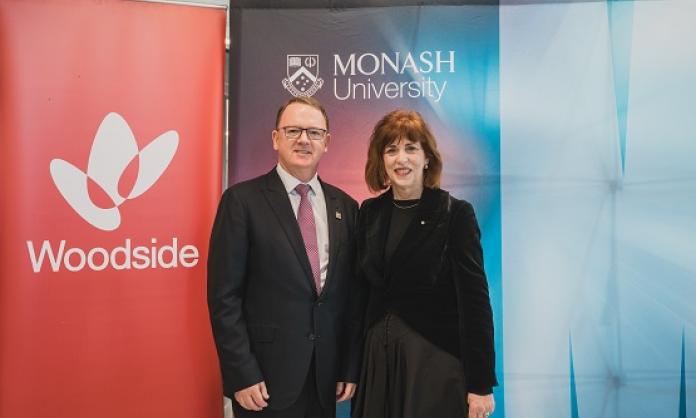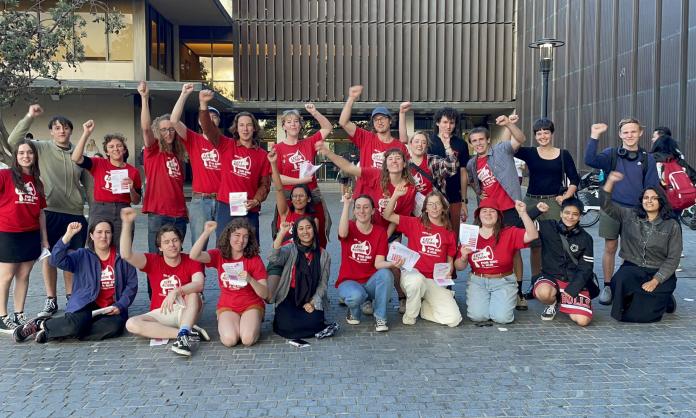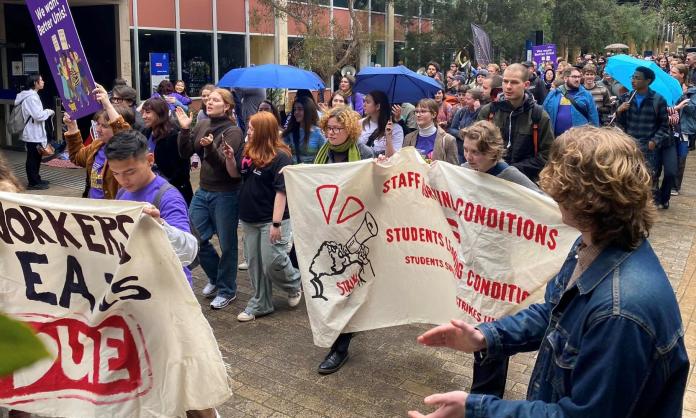In 2020 the University of New South Wales (UNSW) partnered with universities around the world to form the International Universities Climate Alliance. Ian Jacobs, vice-chancellor of UNSW, boasted of the university’s “proud history of being at the forefront of climate science and renewable energy”.
Other members of the alliance include the University of Melbourne, which claims it is “developing real world solutions for a safer climate future”, and Monash University, which acknowledges that “the response to climate change requires deep commitment through our education and research”.
It may come as a shock then to find out that UNSW, Melbourne and Monash all have extensive and well-documented partnerships with the fossil fuel industry. In fact, the entire higher education system is connected to the industry by a thousand threads.
These connections take many forms. First are the open, blatant partnerships between individual universities and mining companies. Mining corporations need graduates with the relevant skills and depend on research on how to exploit Earth’s natural resources most efficiently, and they’re willing to use some of their ample profits to pay for it. Universities, for their part, are more than happy to hitch themselves to the highest bidder.
The University of Sydney partners with Rio Tinto, which destroyed a sacred Indigenous site at Juukan Gorge in 2020. Together they operate the Rio Tinto Centre for Mine Automation, working “towards realisation of fully-autonomous integrated mining operations”.
Woodside, one of Australia’s largest oil and gas producers, has a partnership with the University of Western Australia. Its then CEO Peter Coleman described this, in 2019, as playing a “crucial role in unlocking new gas resources off Western Australia’s north coast in support of our growth activities”.
Then there are the less open links. These take more digging to uncover. Follow the money, though, and you’ll find them. For a start, the Australian Research Council, the government body in charge of distributing research funding to universities, allocates significant amounts of public money to projects that benefit the fossil fuel industry.
That industry also directly funds universities to carry out research on its behalf. The Australian Coal Industry’s Research Program (ACARP) is a slush fund “100 percent owned and funded by all Australian black coal producers”. According to its 2022 annual report, ACARP was then overseeing more than $91 million invested across 277 research projects—171 of them in partnership with 15 different Australian universities.
University research teams make direct applications to ACARP on the basis that their research will benefit the coal industry, and successful projects are overseen directly by fossil fuel executives. Among the top recipients in 2022 were the University of Queensland, the University of Newcastle and UNSW—that great institution at the “forefront of climate science and renewable energy”—which had $8.7 million worth of coal industry-funded research under way.
Look into any university, and you will find a litany of scholarships, internships, research grants and careers expos—all funded by fossil fuel companies to enmesh themselves with the university sector. Laboratory spaces on campuses are regularly used by fossil fuel companies, and universities have research teams and business specialists at the ready to liaise with mining corporations in need of “end-to-end solutions”.
Funding also flows in the other direction. Universities hold, via their endowments, millions of dollars of investments in the fossil fuel industry.
On top of all the money, there is direct, personal influence. There’s a revolving door between the senior ranks of universities and fossil fuel corporations. Almost every Australian university has a board member with a background in fossil fuels. The current chancellor of Monash University, Simon McKeon, is also a director at Rio Tinto, while the chancellor of Deakin University, John Stanhope, used to be a director at AGL, Australia’s largest carbon emitter. Monash University’s Department of Civil Engineering even has a resources engineering industry advisory committee stacked with current mining executives who have sway over the university’s research program.
This is all pretty out of step with what students, staff and the general public might expect from higher education institutions, and the universities clearly know it. Ties to fossil fuel companies are kept, for the most part, in the background, while publicly universities declare themselves to be world leaders in climate action, with campus carbon neutrality targets, sustainability departments in charge of composting and loud promotion of “green” research.
Why does the higher education sector, seen by many as a force for progress and enlightenment, have such deep connections to such a destructive industry? It’s not, as some might think, because it has somehow been “corrupted” by the influence of mining magnates on university governance. Nor is it just a matter of government policy.
In contrast to the “progressive” image they often foster, universities are fundamentally conservative institutions, geared to meet the needs of capitalism. They are funded by the government, and increasingly by businesses directly, to produce research, innovation and skilled workers required for a profitable and globally competitive capitalist economy. In Australia this means, among other things, serving the needs of the incredibly profitable fossil fuel industry.
This isn’t to say change is impossible. Victoria University in Toronto, Canada, recently announced its intention to divest fully from fossil fuels by 2030. This decision, however, came only after an 18-day occupation of a university building by 200 climate activists. Similar announcements from universities across Australia and the US over the past few years show that climate activism on campuses can have an impact on the decisions of corporate universities.










